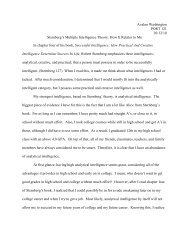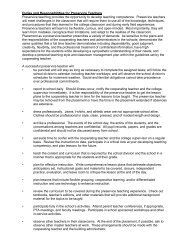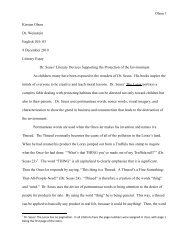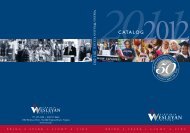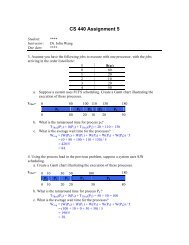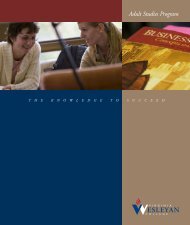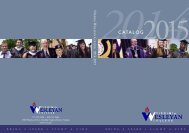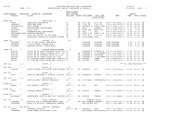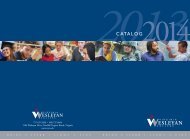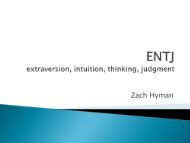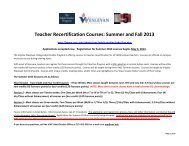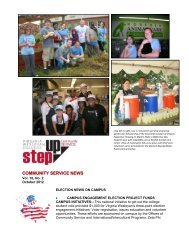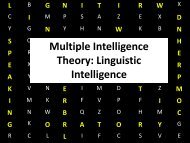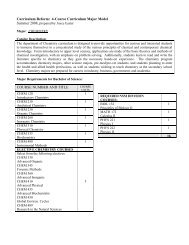2008-2009 Catalog - Virginia Wesleyan College
2008-2009 Catalog - Virginia Wesleyan College
2008-2009 Catalog - Virginia Wesleyan College
- No tags were found...
Create successful ePaper yourself
Turn your PDF publications into a flip-book with our unique Google optimized e-Paper software.
62 CHEMISTRYsociology, and religious studies. The study of religiousfreedom at <strong>Virginia</strong> <strong>Wesleyan</strong> <strong>College</strong> may be engagedthrough the many educational programs offered by theCenter for the Study of Religious Freedom as well asthrough CSRF courses.CSRF COURSES (CSRF)100 Religious Freedom Symposium (1)A non-traditional course that explores in greater depththe themes addressed in the Center’s Symposium series.Students attend the symposium programs, read backgroundmaterials and participate in discussions primarily on line.Pass/fail grading. Offered intermittently.232 Religion and American Politics (4) (V)Identical to RELST 232.275 Religious Freedom in America (3)An examination of the historical development andpresent state of religious freedom in the United States.Topics include the emergence of the idea of religioustoleration in the West, the influence of Jefferson’s <strong>Virginia</strong>Statute for Religious Freedom, the concepts ofestablishment and free exercise of religion in the U.S.Constitution, and the role of religion in American publicand political life. Students acquire a conceptual frameworkand vocabulary for discussing current issues. The course isinterdisciplinary in nature, drawing on historical, legalphilosophical and political sources. Offered spring of evennumberedyears.355 Law and Religion in America (4)Explores the various ways in which law and religioninteract with and impact upon each other in American life.The approach is contextual and case-driven, meaning thatwe get at the larger, philosophical issues through themedium of specific legal cases and public debates from ourpast and present. Through these case studies, we reach thebroader concerns: the legitimacy of law (“Where the lawcomes from”), the experience of free exercise of religion inAmerican history, the legal enforcement of morality, andthe establishment clause limits on the power of themajority. Prerequisites: at least six, preferably nine, semesterhours in one or more of the following: religious studies,history, philosophy, political science.CHEMISTRYDR. JOYCE B. EASTER, Program CoordinatorDR. MAURY E. HOWARDDR. DEBORAH E. OTISThe Department of Chemistry curriculum is designedto provide opportunities for curious and interested studentsto immerse themselves in a concentrated study of thevarious principles of classical and contemporary chemicalknowledge. From introductory to upper level courses,applications are made of the basic theories and methods ofchemical investigation, with an emphasis on problemsolving.The chemistry program accommodates chemistrymajors, other science majors, pre-med/pre-vet students, andstudents planning to enter the health and allied healthprofessions, as well as students wishing to teach chemistryat the secondary school level. Chemistry majors areprepared for careers in industry, business, government, andacademia.Major RequirementsThose courses designed for non-science majors,including CHEM 105, cannot be counted toward themajor in chemistry (63-65 semester hours), but may becounted toward the degree (120 semester hours). Thestudent’s academic program must be planned carefully ifspecific goals are to be achieved. Close coordination withthe student’s adviser is essential. In order to meet basicrequirements in the major and for participation in the fouryeargraduation guarantee, the following course of study isdetermined by the year of entry.To complete the college’s requirement in the area ofcomputer literacy, students majoring in chemistry mustshow a proficiency in: 1) the use of e-mail, 2) the use ofword processing, 3) the use of the Internet, and 4) the useof multimedia software. This proficiency is demonstratedby completing assignments in several courses required inthe major, which include CHEM 118, 210, 311, 312, 322,411, 412, 422, and 437.Students seeking certification as secondary teachers ofchemistry must also successfully complete either EES 130or EES 132, in order to satisfy the requirement in the areaof earth science.Bachelor of Science:COURSE NUMBER AND TITLECHEM 117<strong>College</strong> Chemistry ICHEM 118<strong>College</strong> Chemistry IICHEM 210Analytical ChemistryCHEM 260Inorganic ChemistryCHEM 300Chemical Literature SurveyCHEM 311Organic Chemistry ICHEM 312Organic Chemistry IICHEM 321Organic Chemistry Laboratory ICHEM 322Organic Chemistry IISEM.HRS.See continuation of choices next page444313311



